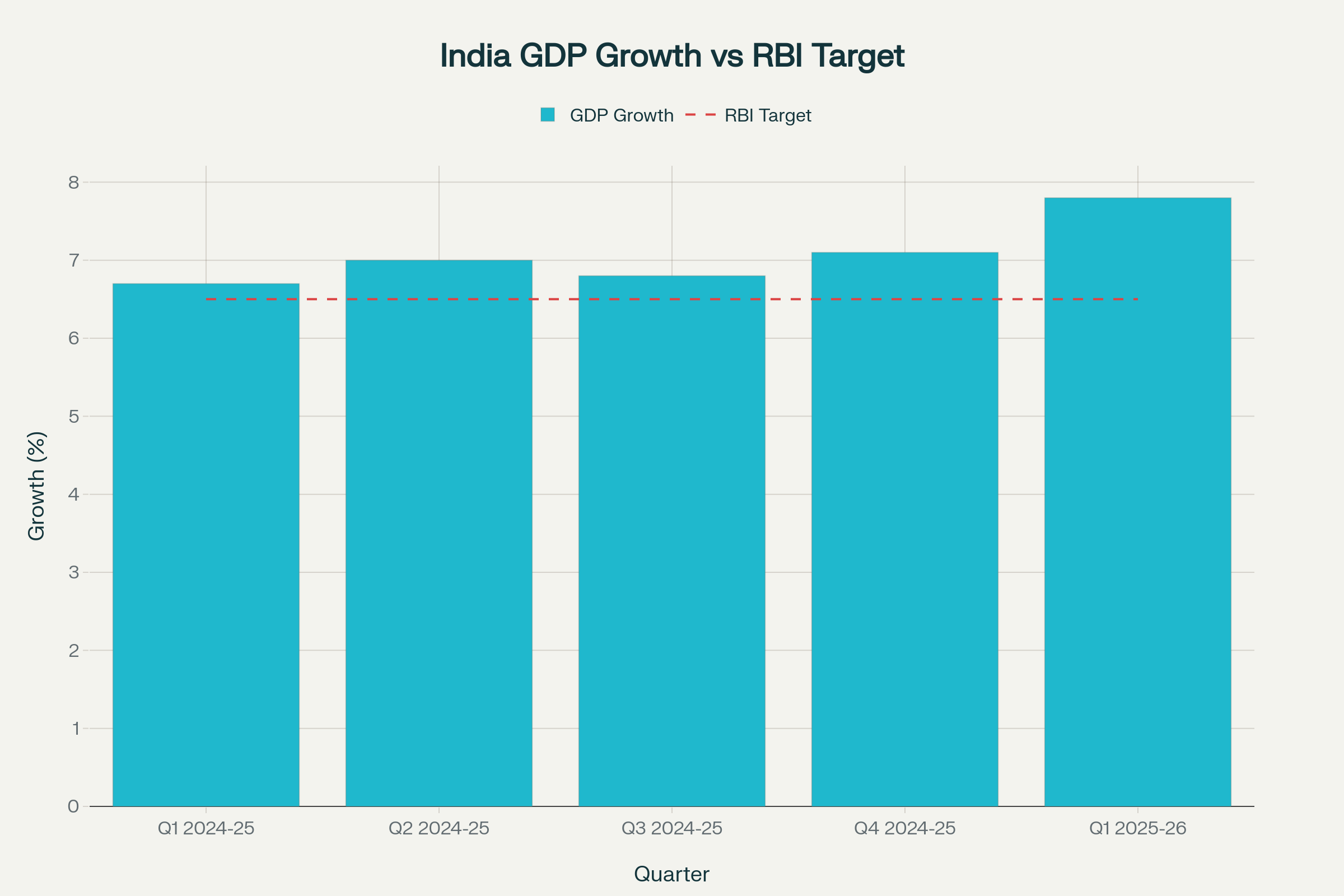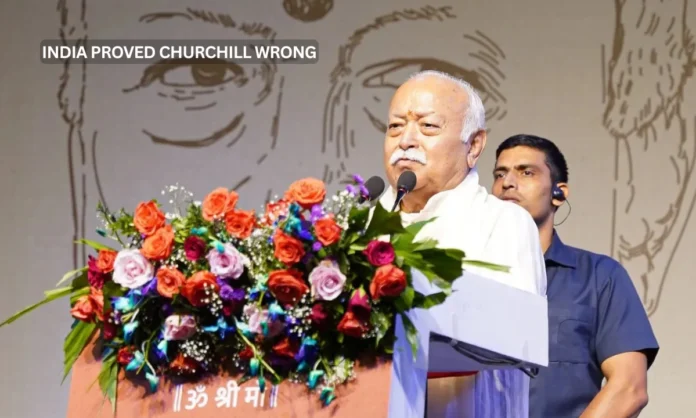Key Highlights:
- RSS Chief Mohan Bhagwat stated India defied Winston Churchill’s predictions of post-independence collapse by maintaining unity and achieving robust economic growth
- India recorded 7.8% GDP growth in Q1 FY 2025-26, the fastest pace in five quarters, while UK grapples with Brexit-induced divisions
- Bhagwat emphasized India’s traditional philosophy of balancing knowledge, action, and devotion as the foundation for sustained development
Initial Context: RSS Chief Challenges Historical Predictions
RSS Chief Mohan Bhagwat delivered a powerful statement on September 15, 2025, asserting that India has successfully proven Winston Churchill wrong by maintaining unity and achieving unprecedented development since independence. Speaking at a book launch event in Indore, Madhya Pradesh, RSS Chief Mohan Bhagwat referenced the former British Prime Minister’s prediction that India would fragment after British rule ended, highlighting how the nation has instead flourished while the UK itself faces internal divisions.
चर्चिल ने कहा था कि तुम टिकोगे नहीं, स्वतंत्र हो जाओगे तो बँट जाओगे; जो कि नहीं हुआ। इंग्लैंड बँटने की स्थिति में आ रहा है, लेकिन हम नहीं बँटेंगे, बढ़ेंगे आगे।
— Dr Mohan Yadav (@DrMohanYadav51) September 14, 2025
– परम पूज्य सरसंघचालक आदरणीय @DrMohanBhagwat जी, आर.एस.एस pic.twitter.com/oVyUQMnSFE
The timing of these remarks by RSS Chief Mohan Bhagwat coincides with India’s impressive economic performance, with the country recording a robust 7.8% GDP growth rate in the first quarter of fiscal year 2025-26. This statement by the RSS leader reflects broader themes of national unity and civilizational strength that resonate across India’s diverse political and social landscape.
Churchill’s Predictions Versus India’s Reality
RSS Chief Mohan Bhagwat specifically cited Winston Churchill’s historical assertions about India’s post-independence future, drawing stark comparisons between predictions and reality. The British wartime leader had famously predicted that India would collapse into chaos and division once British control ended, viewing the subcontinent as incapable of self-governance.
- Churchill believed India would fragment into competing factions and lose political stability
- The former Prime Minister expected economic collapse and social disorder to follow independence
- Historical records show Churchill favored partitioning India into multiple weak states under British influence
According to RSS Chief Mohan Bhagwat, these dire predictions have been thoroughly disproven by India’s sustained unity and development trajectory. The irony, as noted by the RSS leader, lies in the fact that Britain itself now faces significant internal divisions, particularly following Brexit and ongoing Scottish independence movements. While Churchill envisioned India’s fragmentation, the reality shows RSS Chief Mohan Bhagwat‘s assessment that “England itself is coming to the stage of division, but we will not be divided” has proven prescient. The 2016 Brexit referendum revealed deep geographic and demographic splits within the UK, with Scotland voting 62% to remain in the EU while England voted 53% to leave.
India’s Economic Triumph Defying Global Expectations
RSS Chief Mohan Bhagwat‘s observations align with India’s remarkable economic performance that continues to exceed international forecasts. India’s GDP growth of 7.8% in the April-June quarter of 2025-26 represents the fastest expansion in five quarters, significantly outpacing the Reserve Bank of India’s projection of 6.5%.
- Real GDP reached ₹47.89 lakh crore in Q1 2025-26, up from ₹44.42 lakh crore in the same quarter of 2024-25
- Nominal GDP grew by 8.8%, touching ₹86.05 lakh crore versus ₹79.08 lakh crore year-on-year
- Services sector led growth at 9.3%, while manufacturing expanded by 7.7% and construction by 7.6%

India’s GDP Growth Trajectory: Validating RSS Chief Mohan Bhagwat’s Statement on Proving Predictions Wrong
The robust performance validates RSS Chief Mohan Bhagwat‘s assertion that India continues moving forward on the development path by proving skeptics wrong. This economic strength, emphasized by the RSS leader, stems from India’s adherence to traditional philosophical principles that balance knowledge, action, and devotion. As RSS Chief Mohan Bhagwat noted, this philosophical foundation has enabled India to maintain unity and purpose despite global uncertainties and challenges. The contrast with global economic struggles further reinforces the RSS Chief’s argument that India’s civilizational approach offers sustainable development pathways.
Philosophical Foundations of India’s Success
RSS Chief Mohan Bhagwat attributed India’s sustained success to its traditional philosophy that emphasizes the balanced trinity of knowledge, action, and devotion. This philosophical framework, according to the RSS leader, differentiates India’s approach to development from Western models that prioritize competition over cooperation.
- India’s cultural emphasis on unity transcends divisions of “mine and yours,” fostering collective progress
- The nation’s reverence for nature through worship of rivers, trees, and natural elements provides sustainable development guidance
- Traditional wisdom integrates spiritual values with practical governance and economic policies
RSS Chief Mohan Bhagwat contrasted this approach with global trends toward divisiveness and environmental degradation, noting that countries following purely materialistic models face increasing social fragmentation. The RSS leader’s observation about India’s historical leadership spanning 3,000 years without conquering other nations or suppressing their trade demonstrates alternative models of global engagement. This philosophy, as articulated by RSS Chief Mohan Bhagwat, enabled India to lead the world historically while maintaining peaceful relationships and cultural exchange rather than domination. According to the RSS Chief, this same philosophical foundation now guides India’s modern development approach, creating sustainable growth that benefits both the nation and global community.
Contemporary Implications and Future Trajectory
The statements by RSS Chief Mohan Bhagwat reflect broader strategic thinking about India’s role in an increasingly fragmented global landscape. While Western democracies grapple with internal divisions and identity crises, RSS Chief Mohan Bhagwat presents India as a stabilizing force rooted in civilizational continuity and philosophical coherence.
- India’s approach to unity offers alternative models for diverse societies worldwide
- The nation’s economic success demonstrates viability of indigenous development philosophies
- Cultural values emphasizing collective welfare provide frameworks for addressing global challenges
The RSS leader’s reference to England’s current divisions serves as a pointed reminder of how predictions can backfire when they underestimate civilizational resilience. The ongoing debates around Scottish independence, Northern Ireland’s status, and post-Brexit economic challenges validate RSS Chief Mohan Bhagwat‘s observation about Britain’s fragmentation trajectory. Meanwhile, India’s consistent economic growth, democratic stability, and cultural cohesion provide empirical support for the RSS Chief’s assertions about the nation’s developmental model. As RSS Chief Mohan Bhagwat concluded, India’s role as an actor in the global drama requires playing its part well while remaining detached from narrow self-interest, offering wisdom for international relations.
Closing Assessment: India’s Vindication of Cultural Approach
RSS Chief Mohan Bhagwat‘s September 2025 observations capture a pivotal moment in global affairs where India’s sustained success challenges Western assumptions about development and governance. The stark contrast between Churchill’s predictions and India’s achievements over nearly eight decades of independence demonstrates the limitations of colonial-era thinking about non-Western societies. With India maintaining 7.8% GDP growth while established Western economies struggle with internal divisions and slower development, the RSS leader’s arguments gain empirical validation. RSS Chief Mohan Bhagwat‘s emphasis on philosophical foundations rather than purely materialistic approaches offers profound insights for nations seeking sustainable development models rooted in cultural authenticity rather than imposed external frameworks.


